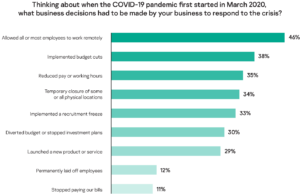At the start of the pandemic in March 2020, for 29% of small businesses developing new products was a way to respond to the challenging situation, according to a recent Kaspersky report. The restrictions shocked the economic well-being of the majority of SMEs (66%) and they were called upon to take many cost-saving measures. In light of this, the launch of new offers or business opportunities, as well as other measures taken, it was an attempt at survival.
The ability of a business to respond adequately to crisis situations can allow it to turn the crisis into an opportunity, making the most of it. According to Steven Callander, a professor of political economics at the Stanford Graduate School of Business, “the goal for a business is to treat the crisis as a management problem” and “thrive by coming to the forefront.” In light of the pandemic, the decisions they were very complex. Organizations had to take into account external factors – lockdowns, new health requirements, radically changed lifestyles – and their business capabilities.
In addition to the launch of new products and services (29%), as an active response to the crisis, one in five organisations entered new business sectors (21%). For companies in the fields of events, entertainment, art and culture, or even in the health sectors this may mean the introduction of a digital alternative to their physical offerings. For shops or restaurants – entering online sales and delivering products at home. For manufacturers – the production of masks, disinfectants and other medical accessories or products for comfort at home.
Among other measures against the crisis, expectedly the most common, was to allow all or most employees to work remotely (46%). However, the majority of decisions were still aimed at optimising spending: agencies introduced budget cuts (38%), reduced wages or working hours (35%), budget diversion or closure of investment projects (30%). One in ten companies had to take critical measures such as layoffs of employees (12%) or stop pay bills (11%).

“Although some decisions were difficult, they were still necessary. Now, it’s good to know that the overall feeling about the effects of the pandemic is somewhat positive for small companies: two-thirds (63%) agree that their businesses have responded well to the global challenge. Lessons learned will now help them better prepare for future challenges, improve their current investment plan and processes, test new things with boldness and become more digital. I also believe that the products and services that were launched as a response will remain relevant because the restrictions against COVID-19 are still in place and people continue to follow the digital habits achieved during the pandemic,” comments Andrey Dankevich, Senior Product Marketing Manager at Kaspersky.
For the companies that want to acquire more technological knowledge and be more secure in the digital world, Kaspersky has unveiled the Cybersecurity on a Budget platform with free guides on how to save on online tools, communicate with customers, protect sensitive data and more.


